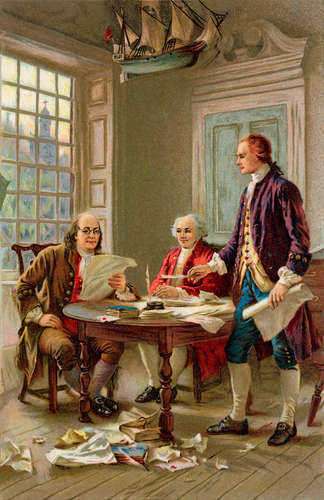George Mason
Founding Father: George Mason
George Mason was born on December 11, 1725, in Fairfax County, Virginia. His parents were George and Ann Thomson Mason. In 1735, George’s father died on the Potomac River in a boating accident, when his boat capsized and he drowned.
After this, young George Mason was sent to his uncle, John Mercer, who raised him. George Mason’s future education was shaped profoundly by the contents of John Mercer’s library that had 1500 different volumes, a third of them concerning law.
George Mason established himself as a very important figure in the community. As the owner of Gunston Hall, Mason was one of Virginia’s richest planters. On April 4, 1750, Mason married Anne Eilbeck, who was from a plantation in Charles Country, Maryland.
He was married to her for 23 years of and during this time, they had nine surviving children; four daughters and five sons. In 1752, George Mason acquired an interest in the Ohio Company, a company that speculated in western lands. In 1773, the crown revoked the rights of Ohio Company. George Mason, as the company's treasurer, wrote his very first major state paper titled “Extracts from the Virginia Charters, with Some Remarks upon Them”.

Around this time, George Mason also began to pursue his political interests. Mason was a justice of the Fairfax County court. Between 1754 and 1779, George Mason was also a trustee of the city of Alexandria. In 1759, Mason was elected as a member of the Virginia House of Burgesses. When the Stamp Act of 1765 created outrage in the colonies, Mason wrote an open letter where he explained the colonists' position and distress regarding the act to a committee of London merchants, in hopes of enlisting their support.
In 1774, George Mason was at the forefront of political events once again when he helped write up the Fairfax Resolves, a document that outlined the constitutional grounds of the colonists for their objections to the Boston Port Act. George Mason also framed Virginia's Declaration of Rights in 1776, which was widely copied in many of the other colonies. This document also served as a model for Jefferson when he was writing in the first section of the Declaration of Independence. Furthermore, the Virginia Declaration of Rights was also the foundation for the Bill of Rights in the Federal Constitution.
The years from 1776 to 1780 were full of great legislative activity. The ratification of the Declaration of Independence and the creation of a government that was independent of Great Britain required the talents of people like George Mason. Mason supported the disestablishment of the church in America and was very active in the organization of military affairs, particularly in the West. The influence of Mason’s early work, “Extracts from the Virginia Charters,” can be seen in the peace treaty of 1783 with Great Britain, which adjusted the Anglo-American boundary at the Great Lakes rather than the Ohio River. After independence, George Mason created up the plan for Virginia's cession of some of its western lands to the United States.
However, by the early 1780s, George Mason grew tired with the conduct of public affairs and decided to retire. In 1780, he then married his second wife, Sarah Brent. Five years later, George Mason attended the Mount Vernon meeting. This was a prelude to the Annapolis convention of 1786. While he was appointed to attend, he did not go to Annapolis.
While George Mason did not attend the Annapolis Convention, he did attend the Constitutional Convention. In Philadelphia in 1787, George Mason was one of the top five most frequent speakers at the Convention. Here, Mason exerted great influence. However, during the final two weeks of the Constitutional Convention, he decided against signing the United States Constitution.
George Mason's refusal sparked some surprise from many people, particularly since his name is linked very closely with constitutionalism. Mason explained his reasons for not signing the Constitution at length, stating that the lack of a declaration of rights was his biggest concern about the Constitution. He then talked about the different provisions of the United States Constitution point by point, starting with the House of Representatives.
George Mason criticized the House of Representatives by saying it was not truly a good representative of the country, since the Senate as too powerful. He also felt that the power of the federal judiciary had the potential to destroy the state judiciaries, rendering justice unattainable, and enabling the rich to easily oppress and destroy the poor. Because of these fears, George Mason came to the conclusion that the new government was meant to either become a monarchy or wind up in the hands of a powerful, corrupt, and oppressive aristocracy.
Two of George Mason's biggest concerns were later incorporated into the Constitution. The ratification of the Bill of Rights answered George Mason’s main objection, and the 11th amendment to the Constitution addressed his request for strictures placed on the judiciary branch.
Throughout his career, George Mason was guided heavily by his belief in the rule of reason as well as his beliefs in the centrality of the natural rights of man. Mason approached problems rationally, impersonally, and coolly. In recognition of Mason’s accomplishments and dedication to the important principles of the Age of Reason, George Mason has been often thought of as the American manifestation of the Enlightenment. George Mason passed away on October 7, 1792, and was put to rest on the grounds of Gunston Hall.
Fun Facts about George Mason
• George Mason is sometimes thought of as the “Forgotten Father” and was also known as a “reluctant Statesman” and the “Penman of the Revolution”
• Another reason why he did not sign the Constitution was because it did not abolish slavery.
• The George Mason Memorial was dedicated on April 9, 2002, in Washington, D.C.